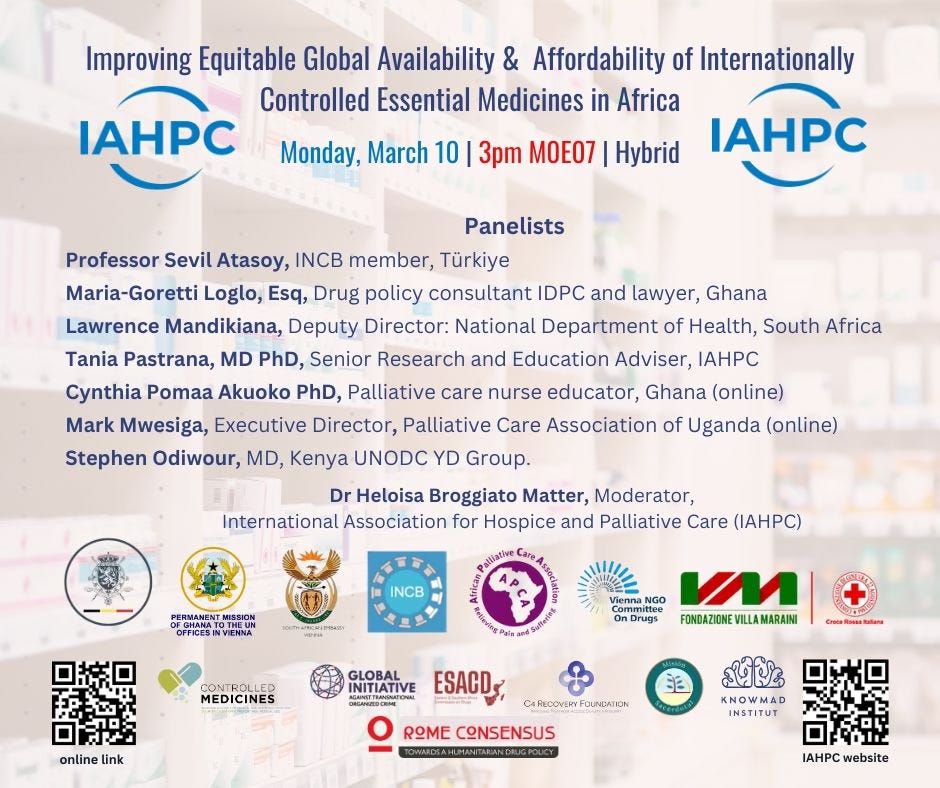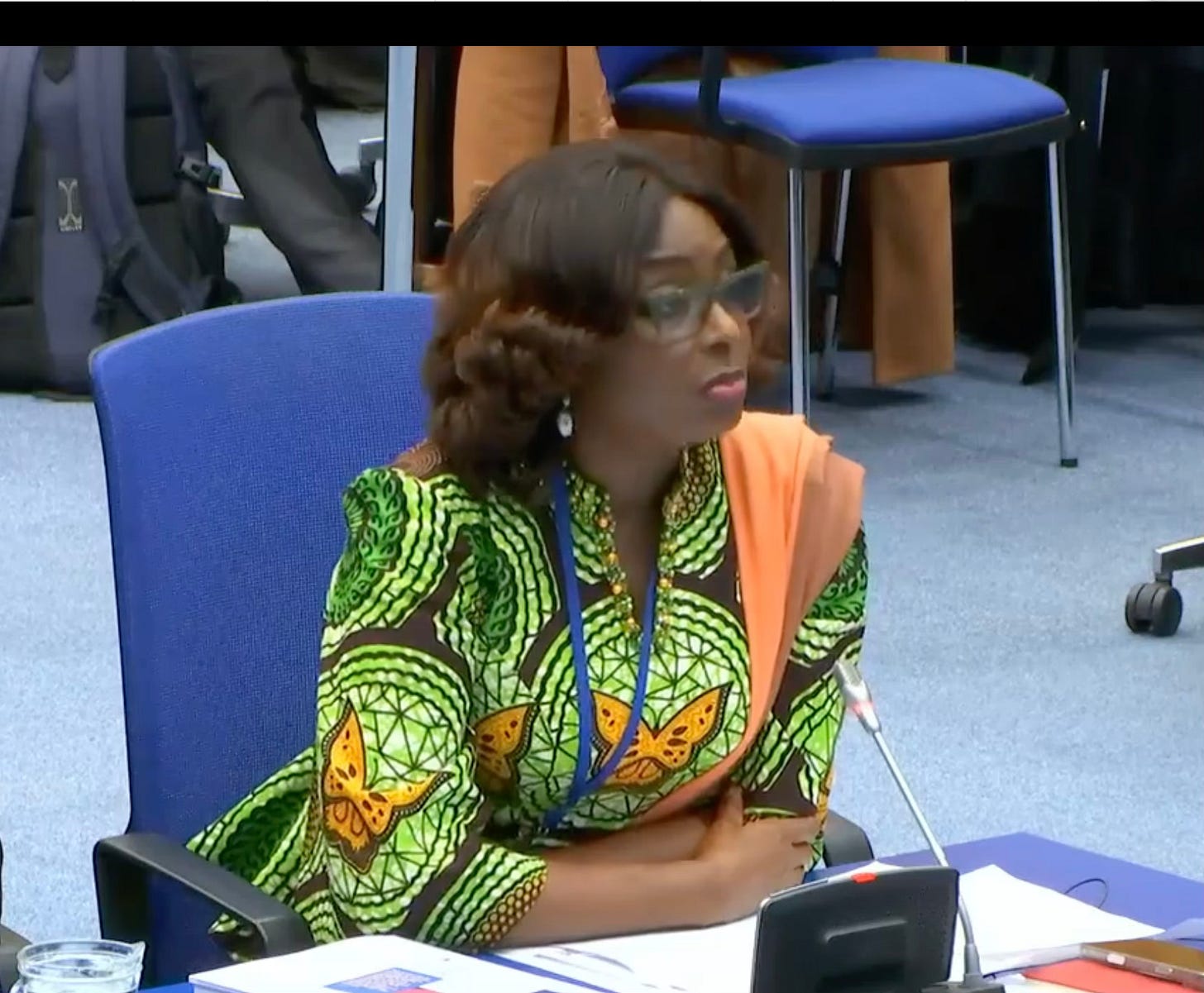
The IAHPC side event on the margins of the 68th Session of the Commission on Narcotic Drugs titled “Improving equitable access to internationally controlled essential medicines in Africa through inter-agency, member states and civil society collaboration,” was co-sponsored by the permanent missions of Belgium, Ghana, South Africa, along with numerous civil society organizations.
Moderated by IAHPC member Heloisa Broggiato Matter, PhD, the panel kicked off with a statement by International Narcotics Control Board (INCB) member Prof Sevil Atasoy, who affirmed the Board’s commitment to improve availability and affordability of controlled medicines. Ms Maria-Goretti Loglo, Esq, a Ghanaian human rights lawyer, discussed the Model West African Drug Law’s provisions on availability of controlled medicines. Cynthia Pomaa Akuko, a PhD nurse educator from Ghana, joined online to brief the audience on availability of controlled medicines for clinical use. Mr Lawrence Mandikiana, representing the South Africa Department of Health emphasized the fact that that, while more than 80% of people in Africa have no access to controlled medicines to improve their quality of life during serious illness, South Africa is operationalizing an Essential Drug program with an Essential Medicines list matched with palliative care symptoms. The IAHPC’s Dr Tania Pastrana concluded with a brief glimpse into the cost of opioid pain medicines for palliative care in Ghana for a person earning the minimum wage based on the IAHPC’s Opioid Price Watch methodology. As in many countries, the price to working consumers exceeds take minimum wage home pay, leaving nothing for food, rent or other expenses.
Ghana’s Ambassador to Vienna, HE Matilda Aku Alomatu Osei-Agyeman’s closing remarks to the hybrid side event began
HE Matilda Aku Alomatu Osei-Agyeman giving Ghana’s intervention in plenary
Excellencies and esteemed participants, It is a great honour to address this gathering on a subject that lies at the heart of our shared commitment to health equity and human rights. […This] issue is not merely a technical challenge but a profound moral imperative that intersects with global health, sustainable development, and the realization of fundamental human rights.
After reflecting on some of the panelists’ presentations, the Ambassador concluded with a practical recommendation for technical and financial high-income country support for health systems and local manufacturing of morphine in Africa as a form of restorative justice.
Former colonial powers have a responsibility to support their former territories in building sustainable healthcare systems. This is how we try to solve the challenges of economic disparities and social inequalities. This includes investing in local production of internationally controlled medicines as a form of reparatory justice. For instance, African nations should not have to import morphine when the raw materials can be cultivated and processed locally. Supporting local production reduces dependency on imports, strengthens regional supply chains, and fosters self- sufficiency.
IAHPC delegation members at CND immediately took up this call to action in our final statement to the CND plenary on Agenda Item 6, “Follow-up to the implementation at the national, regional and international levels of all commitments, as reflected in the Ministerial Declaration of 2019, to address and counter the world drug problem.” We reminded the member states in attendance that
Ghana suggested yesterday in plenary that high income countries with sufficient availability have both a moral and legal obligation to support their former territories to overcome systemic barriers to accessibility and affordability of internationally controlled essential medicines. This includes providing financial resources and technical expertise to build resilient pharmaceutical industries to manufacture generics.
Restorative justice (RJ) is neither development aid, nor charity, but mutually beneficial activity that involves extensive consultations and a reckoning with the damage done by extractive colonial practices that benefited one party at the expense of another. Although RJ is sually deployed in criminal justice systems, Ghana and the IAHPC are suggesting that the same principles be applied to international drug policy practice as a constructive solution to the ‘wicked problem’ of low and inadequate availability of internationally controlled essential medicines.
IAHPC is very happy with this outcome of our side event, as it provides our advocacy team, and those of our partners at national and regional palliative care associations, with an authoritative and operationalizable recommendation to policymakers in both high- and low-income countries. Recommending technical support for improved availability of controlled medicines as a form of restorative justice reflects proposals first aired in a Lancet Global Health “Comment” published by IAHPC and APCA in 2024.


































